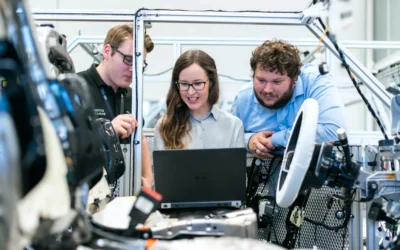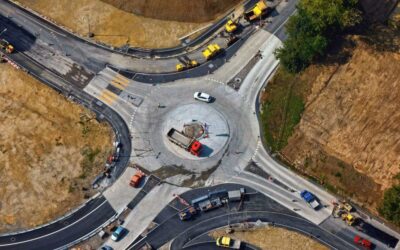Engineers are problem-solvers, creators and builders. They use their scientific and mathematical knowledge to improve the world around us.
The number of specialisations you can pursue is vast. Below, PhD candidate, Hazel Wee, explains the seven main branches:
Aerospace engineering explores flight and space, designing aircrafts, spacecrafts and propulsion systems.
Biomedical engineering bridges engineering and medicine, creating medical devices and technologies for the healthcare industry.
Chemical engineering merges chemistry, physics and maths to develop manufacturing processes for pharmaceuticals and materials.
Civil engineering is dedicated to shaping our physical environment, encompassing the construction of buildings and bridges.
Computer engineering focuses on hardware, software and the development of computers, networks and embedded systems.
Electrical engineering delves into the realm of electronics, playing a vital role in powering out modern world.
Mechanical engineering centres around the design and creation of mechanical systems, from engines to manufacturing processes.
Whichever branch you end up pursuing, a career in the field will see you working in a team of problem solvers and innovators.
Experience first-hand what it’s like to study and work in engineering with our Engineering summer school in Oxford.
Which Subjects Do You Need for an Engineering Degree?
Maths and physics make up the core preparatory subjects, with some universities also requiring further maths if students are following the A-level system.
If you’re hoping to specialise in chemical or biological engineering then chemistry and biology will be necessary to set you up for those courses. Design, technology and similar courses may also prove beneficial. For subject recommendations specific to different disciplines, see our in-depth guide on the A-level requirements for an engineering degree.
If you’re keen to advance your pre-university learning further, find out more about our online Engineering course and our online Mathematics course.
How Do I Become an Engineer?
An engineering degree is certainly a common way into the industry, but it is by no means the only route.
Many firms, both small and large, offer apprenticeships to school-leavers which give high-quality training without the burden of student debt. If you can find a firm offering an apprenticeship in the field you’re interested in, then it can be a great way into the industry. However, this route isn’t for everyone as apprenticeships can limit you to the particular type of engineering that the company specialises in.
A general degree in Engineering Science is an excellent foundation to a build a career on. However, if you’re looking to work in chemical, electrical or mechanical engineering, then it’s beneficial to have earned a degree in this specific field.
It’s quite common for graduates to continue with postgraduate study. This not only opens up a career in academia, but many companies actively seek applicants with postgraduate degrees.
Like any career path, your application will always be strengthened by work experience. It’s very common for undergraduate students to undertake summer vacation schemes or internships with employers. Often this can lead to the conditional offer of employment upon completion of their studies.
What Books Can I Read to Prepare?
There are a number of excellent reading recommendations for aspiring engineering students. Here are our top three:
1. ‘The 7 Habits of Highly Effective People: Powerful Lessons in Personal Change‘ by Stephen R. Covey. Divided into three categories, this book offers actionable guidance for solving personal and professional problems. Covey teaches time management, decision making and effective collaboration, all of which are key skills for aspiring engineers.
2. ‘Engineer to Win‘ by Carroll Smith. Focusing on the engineering principles behind the design and construction of high-performance race cars, Smith imparts key knowledge on topics such as aerodynamics, materials science and system optimisation. This book does an excellent job of showing how theoretical knowledge is practically applied in a highly competitive environment.
3. ‘To Engineer Is Human: The Role of Failure in Successful Design‘ by Henry Petroski. Through historical examples and case studies, Petroski argues that failure is a vital part of the engineering design process. This book encourages students to embrace failure as a learning opportunity rather than a setback.

By Oxford Scholastica Academy
The Oxford Scholastica Academy was founded in 2013 by Jamie and Sophie, two former University of Oxford students, who have built a dynamic education company dedicated to empowering young people to chart their path in the world and make it better.





